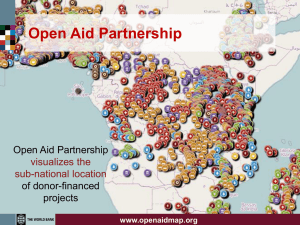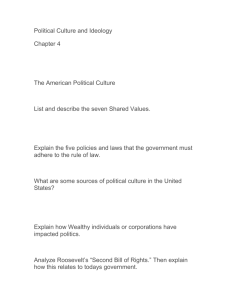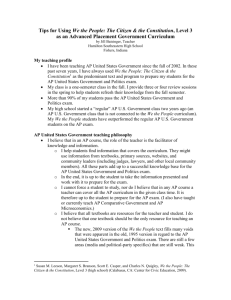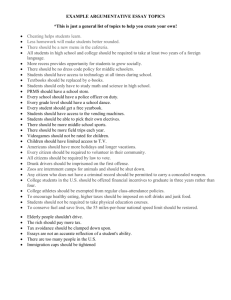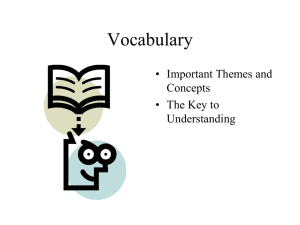File
advertisement
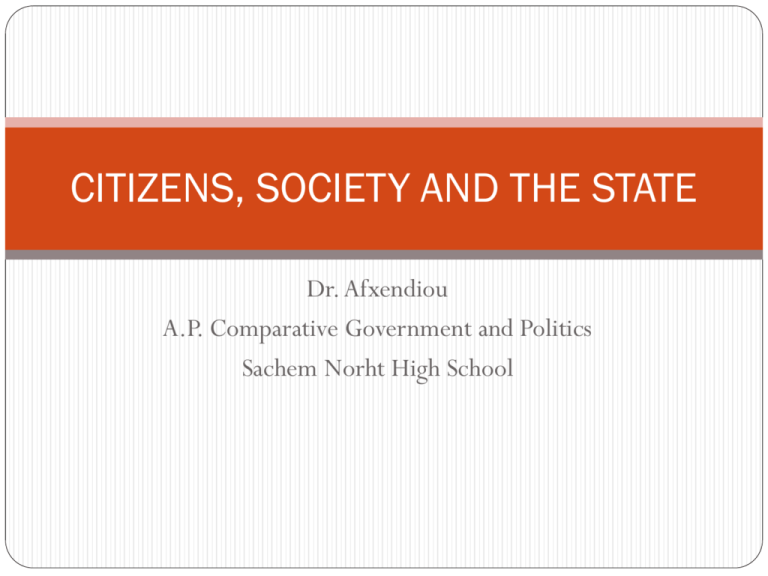
CITIZENS, SOCIETY AND THE STATE Dr. Afxendiou A.P. Comparative Government and Politics Sachem Norht High School A Complex System - CLEAVAGES Society made up of more than government and politics. Citizens participate in many more facets of society. For ex Religion Ethnic groups Race Social and economic classes. These create separations amongst members of a society. The political science term for these separations is SOCIAL CLEAVAGES Citizen – State Relationships For the sake of comparison we create categories: 1. ATTITUDES AND BELIEFS OF CITIZENS Do citizens trust their government? Do they believe that the government cares about what they think? Do they feel that government affects their lives in significant ways? POLITICAL EFFICACY – a way to measure connections between citizens and their government. A citizen’s capacity to understand and influence political events. High level of political efficacy – citizens believe that the government takes their input seriously, that it cares about what they have to say. They also believe that they themselves understand political issues and that they are able to participate in solving problems. Low or lack of political efficacy – citizens may not believe that it is important to participate in politics so they may not vote or they may ignore their government’s efforts to enforce laws Citizen – State Relationships comparison categories continued: 2. POLITICAL SOCIALIZATION How do citizens learn about politics in their country? Do electronic and print media shape their learning? Does the government put forth effort to politically educate their citizens? Is it education or “propaganda?” How do children learn about politics? Development of identifications – belonging to the nation, their ethnic group, their religion. Affect political views Citizen – State Relationships comparison categories continued: 3. TYPES OF POLITICAL PARTICIPATION Varies with the type of government authoritarian government – citizens participate in what are called “subject activities” that involve and show obedience to the government Democratic government – citizens take more active participatory role Most common type of political participation is _____________ Citizens may also work for political candidates of their choice They may attend political meetings or rallies They may contribute financially to their political causes/campaigns They may join political parties Citizen – State Relationships Comparison categories continued 4. VOTING BEHAVIOR Do citizens in the country participate in regular elections? Are the elections truly competitive? If they are not, what is the purpose of the elections? What citizens are eligible to vote, and how many actually vote? Do politicians pay attention to elections, do elections affect policymaking? Citizen – State Relationships Comparison categories continued: 5. FACTORS THAT INFLUENCE POLITICAL BELIEFS AND BEHAVIORS Are there cleavages that affect citizens’ political beliefs and behaviors? Do the lower classes vote for one political party and never the other? Are women’s beliefs and behaviors different from those of men? Are younger people as likely to vote as older people? Do people in rural areas participate in government? Citizen – State Relationships Comparison categories continued: 6. LEVEL OF TRANSPARENCY Transparency – the government operates openly by keeping citizens informed about government operations and political issues and by responding to citizen’s questions and advice. Democratic governments- transparency is the ideal Authoritarian governments – low levels of transparency found Transparency and corruption – high transparency low corruption; low transparency high corruption SOCIAL MOVEMENTS Organized collective activities that aim to bring about or resist fundamental change in an existing group or society Try to influence political leaders to make policy decisions that support their goals Members of social movements challenge mainstream society to reconsider their positions CIVIL SOCIETY Voluntary organizations outside of the state that help people define and advance their own interests Usually strong in liberal democracies where individual freedoms are valued and protected. Organizations may represent class, religious, or ethnic interests, or they may cross them creating strong bonds among people that exist outside of government control Helps to define the people’s relationship to and role in politics and community affairs. Groups may be inherently apolitical but they are the cornerstone of liberty by allowing people to articulate and promote what is important to them. Checks the power of the state and helps to prevent the TYRANNY OF THE MAJORITY or the tendency in democracies to allow majority rule to neglect the rights and liberties of minorities. Global civil society? –nongovernmental organizations (NGOs) – national and international groups independent of any state that pursue policy objectives and foster public participation. CIVIL SOCIETY In authoritarian states – not encouraged, actually threatening In less developed societies – hurt by cleavages that claim all of peoples’ allegiance

